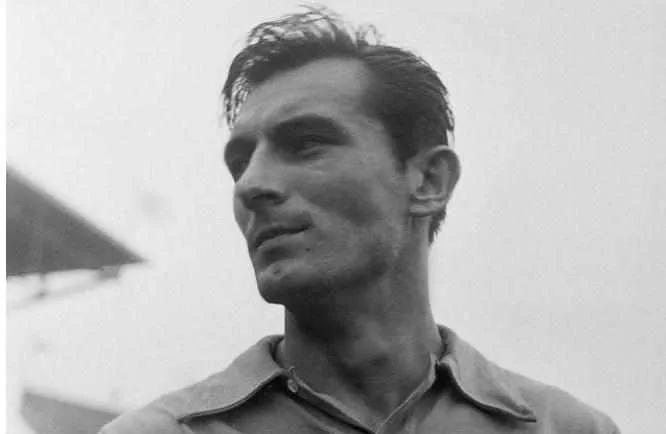Blanco Zebets was born in Zagreb on 17 May 1929. He is 176cm tall and weighs 72kg
Zebetz was athletic, good at headers, and had an almost unparalleled view of the big picture at the time. However, his most representative deed is that the 100-meter sprint time only takes 11 seconds. This has reached the level of the fastest sprinter in Yugoslavia of that era.
Zebets is both offensive and defensive on the left, and even in the moment of attacking and defending, Zebets can retreat from the front to the back like lightning to defend.
In the five years from 1947 to 1951, he helped Borats (now NK Zagreb) to the third consecutive level up to the first division, and the match against Sloga (now Vojvodina) changed his life, and Zebets scored a hat-trick. He was then taken in by the Partisan Belgrade, a Yugoslav magnate.
After moving to Partizan Belgrade, Zebets was soon offered the opportunity to appear in the Yugoslav national team. Yugoslavia played Switzerland at home, with Zebets, who played as a left winger, scored twice. Yugoslavia also beat Switzerland 7-3 at home.
Zebets quickly became the main left winger of the Yugoslav team with his own strength, and then represented the Yugoslav national team at the 1952 Olympic Games. In the first round of the group stage against India, Zebets staged his senior year. Zebets also scored twice against the Soviet Union in the second round of the group stage, scoring another goal in the quarter-finals against Denmark. In the end, the Yugoslav team finished second in the Olympic Games, and Zebets became one of the two top scorers. [The other is his teammate Bobek]
In 1953, Zebets, along with three of his other Yugoslav national team mates, Beyala, Vukas and Kajkovsky, was invited to represent the European Stars in a friendly against England. Zebets played the entire game in his starting appearance, with the European Stars drawing 4-4 away to England.
In the 1954 World Cup, Zebets helped Yugoslavia reach the knockout rounds as the main force, but eventually lost 0-2 to the Federal Republic of Germany in the 1/4 knockout rounds, and could only be relegated to the top 8.
During his nine years with Partisan Belgrade, Zebets helped the team win the Yugoslav Cup twice, and it is worth mentioning that before a crucial match with Hajduk, Zebets suggested that the manager make himself a defender and was agreed, after the left winger and left-back, he once again became the best in the game in his new position. In the 1955/56 Champions League quarter-outs, Partizan Belgrade beat Real Madrid 3-0 at home after falling behind 0-4 away from home, and Zebets and others almost made history.
Zebets' most famous match for the national team was the life-and-death battle between the 1958 World Cup and Romania, and he performed so well on both ends of the offensive and defensive ends that people seemed to see that he had four legs. Yugoslavia coach Milosevic grabbed him by the arms and said, "Are you a human or a beast?" In such a long career of playing and coaching, I have never seen a player perform so perfectly in 90 minutes! congratulations! ”
At the 1958 World Cup, Zebets became the captain of the Yugoslav national team. Although he did not score, he performed well on the left. In the quarter-finals, Yugoslavia once again played against the Federal Republic of Germany. Fate always tricks people, yugoslav team once again lost 0-1 to the Federal Republic of Germany, once again fell in the quarterfinals.
In the summer of 1959, Zebets moved to Red Star Belgrade and won the Yugoslav League in his first season. Zebets soon became captain of the team.
In the 1960 European Championship, Zebets led Yugoslavia to defeat Bulgaria, Portugal, France and other strong opponents. But in the final final, Zebets did not get a chance to play. Yugoslavia was also reversed 1-2 by the Soviet Union and failed to win the European Championship.
Due to the decline in form due to his age, Zebets' main position in the national team has been replaced by Fakhrudin Yusufi, who is 10 years younger than him, and he has gradually become a substitute.
On 4 June 1961, Zebets played for the last time in the national team as a left-back. Yugoslavia beat Poland 2-1 at home in World Cup qualifiers. After this match, Zebets announced his retirement from the Yugoslav national team. Zebets scored 17 goals in 65 appearances for the Yugoslav national team.
After retiring from the Yugoslav national team, Zebets moved to Aachen in Germany, where he announced his retirement after playing for four years. Zebets has been able to play all the positions on the left and at the back in his career, and he is also considered the founder of the free man position. Later, Beckenbauer extended his coverage from the left to the whole field, and the position of free man was born.
After retiring, Zebets also had a good record as head coach. He led Dinamo Zagreb to the final of the International City Fair Cup in 1967, led Bayern Munich to the Bundesliga title in 1969 and completed the first double in the team's history, and led Hamburg to the Bundesliga title and Champions League runner-up in the late 1970s and early 1980s.
On September 26, 1988, Zebets died of an unexpected choking during a meal at the age of 59
